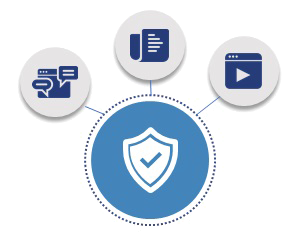6 Ways Identity and Access Management Solutions Can Benefit Healthcare Organizations

Threats from Hackers and Insiders
The interconnected nature of modern healthcare organizations creates IT security risks and makes it a conspicuous target for cybercriminals. In other words, the paradox of digital transformation in the sector enhances health service delivery but also puts sensitive information at risk. Cyberthreats in healthcare organizations originate from external and internal sources.
Hackers launch sophisticated malware and phishing campaigns that plant malicious programs on hospital systems to steal critical information. A case in point is the recent hit on LifeLabs, a Canadian diagnostic and specialty company. The attack that exposed sensitive information of an estimated 15 million Canadians was the largest yet in the country in terms of personal record count. In a different incident, hackers infected three Ontario hospitals with the Ryuk malware, effectively taking email systems offline.
Meanwhile, remote work that has gained popularity in the recent past has resulted in healthcare facilities allowing personnel to use mobile logins without observing necessary security standards. This ongoing trend potentially leaves networks vulnerable to attackers and malware.
Apart from external attacks, healthcare organizations can suffer data breaches launched by insides, including employees, consultants, and business associates. Needless to say, employees have access to patient files, and there is no guarantee that some disgruntled staff will steal sensitive information. In parallel with employees, healthcare providers collaborate with vendors without proper third-party risk management. This slackness allows vendors to access patient information.
Despite these observations, hospitals and clinics in Canada cannot cope with growing cyber threats amid the COVID-19 pandemic, according to cybersecurity professionals. The reason behind this revelation is because healthcare institutions prioritize and channel more resources to front-line care services while putting a bare minimum on IT. On top of that, consistently growing networks in the sector result in fragmented patients' data, leading to redundancy and poor service delivery.
Even if hospitals take cybersecurity seriously, they face another challenge on their hands. They lack adequate resources to purchase innovative security solutions or hire experienced security personnel to manage them. Fortunately, employing solid IAM strategies in the industry can be of account.
Ready to learn more about IAM for healthcare organizations? Contact KeyData today.
IAM – The Foundation of Healthcare Organization Security Efforts
IAM solutions prevent unauthorized people and entities from accessing healthcare organizations' systems and PHI. A reliable IAM program also allows affordable and seamless access to sensitive information and systems while improving the overall patient and employee experience.
As a cybersecurity and compliance solution, IAM offers the following benefits to healthcare organizations:
- Information protection: the most glaring benefit of identity management in the healthcare sector is cybersecurity. IAM ensures PHI and systems remain confidential by managing access rights and establishing a password policy that grants users access to sensitive information and online services. An IAM framework manages employees' and patients' identities and defines their roles and privileges in healthcare systems.
- IAM solutions provide multi-factor authentication that relies on more than passwords to create a barrier between access requests and PHI. Next-generation identity management deploys additional authentication factors like hardware tokens, biometrics, context, geofencing, and time of access request to enhance information security.
- Seamless access control: if you are a healthcare service provider, you are undoubtedly concerned about regulations. A robust IAM solution regulates identities and determines how users navigate systems and their roles. Typically, the solution provides features like single sign-on that centralize all users, making it easy to add, delete, suspend, and manage system access. Hospital admins can easily manage employees in dynamic environments, including work from home staff. A robust IAM solution often features an out-of-the-box reporting capability for regulatory compliance.
- Enhanced user experience: health service providers do not have to log in manually to different hospital systems. IAM features like single sign-on automate access, allowing users to log into a session once and access multiple resources hassle-free.
- Augmenting compliance efforts: deploying IAM solution in healthcare helps providers to improve PHI privacy. This capability, in turn, improves compliance with stringent regulations like the Health Insurance Portability and Accountability Act (HIPAA), the California Consumer Privacy Act (CCPA), and the General Data Protection Regulation (GDPR). Ultimately, implementing bespoke IAM programs for your healthcare organization provides the best balance by meeting security requirements and the access control recommended by international and industry regulations.
- Improved systems audit process: IAM solutions provide both preventive and detective capabilities. The central identity management database that verifies and logs access requests and other operations can provide insights and artifacts for systems audits and documentation.
- Reduced IT management costs: with an automated identity management solution, organizations can streamline operations and reduce costs by eliminating manual user accounts and permission errors. That is to say, the IT admin will no longer manually manage access to data, and the support team will no longer deal with careless users or mistakes that open loopholes for hackers to exploit the systems.
Ways KeyData Helps Healthcare Providers Implement Bespoke IAM Solutions
Whether an organization keeps its data in the cloud or a hybrid environment, KeyData provides robust, seamless, scalable, and secure IAM solutions to protect hospital systems and PHI. KeyData partners with healthcare providers to offer IAM solutions for managing the client's professionals, care providers, patients, and support staff.
KeyData conducts a current state assessment of hospitals' IAM and privileged account management environment. The company develops an IAM target state architecture along with a strategy and roadmap. The solution also includes an access management policy, control standards, and target state processes for IAM.
Contact KeyData today to learn more about securing your organizations with bespoke IAM solution





